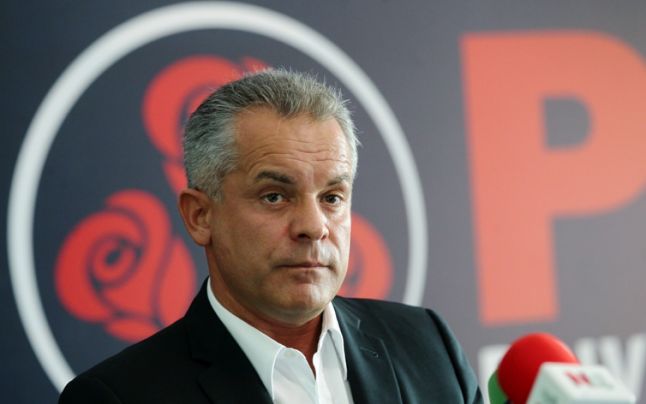
Moldovan Billionaire Plahotniuc Gaining More Political Power
Publication: Eurasia Daily Monitor Volume: 12 Issue: 188
By:

In a country as bereft of leadership talent as Moldova turned out to be, Liberal-Democrat Party leader Vlad Filat’s resignation over corruption charges and his arrest leaves a vacuum in its wake. The charges against Filat, in the form in which they were proffered, have been met with skepticism among pro-Western observers in Chisinau thus far, while local pro-Russia politicians exult in these developments (see accompanying article).
As prime minister of the coalition government (2009–2013) and leader of the coalition’s largest party (2013–2015), Filat was unquestionably Moldova’s most effective pro-Western politician, team builder of the government that achieved Moldova’s Association Agreement with the European Union, and overtly a pro-US and pro–North Atlantic Treaty Organization (NATO) politician. For inspiration, he looked to former Georgian president Mikheil Saakashvili’s model of modernization from above through the use of executive power—a model, however, that Moldova’s parliamentary system fatally precludes. Filat’s Liberal-Democrat Party, organized like all Moldovan parties around the leader’s personality and funding, was the only consistent pro-reform governing party, as well as the largest. This party was a factor of stability and policy continuity in an otherwise dysfunctional system, which ultimately hobbled both the party and its leader.
Filat’s political exit, amid attacks on the Liberal-Democrat Party from multiple directions (from billionaire Vlad Plahotniuc’s Democratic Party inside the governing coalition, as well as from the Red Left parliamentary and extra-parliamentary oppositions), regime-change movements, the rise of pro-Russia parties, the European Union’s declining attractiveness to Moldova while Romania’s attractiveness grows, are trends potentially transforming Moldova in as yet unpredictable ways (see EDM, September 9, October 6).
Filat announced his resignation as party leader in his valedictory speech in parliament, minutes before being taken to the detention center. The Liberal-Democrat Party characterized the charges as “obviously fabricated”; it “condemn[ed] the cynical scenario to denigrate the party and its leader,” and noted that this is the latest in a series of attacks “from a variety of political camps” (see above). Filat’s right-hand man, Valeriu Strelet, holds the post of prime minister since July 31 this year, and he has also taken over as party leader since Filat’s exit (Strelet had earlier headed this party’s parliamentary caucus). The party has decided to remain in the governing coalition, despite Plahotniuc’s intra-coalition coup. Strelet has declared that he would continue heading the government “without fear of blackmail,” without accepting instructions from “Nobil Club” (Plahotniuc’s hotel residence), and without heeding “the legion of bloggers and trolls” (coded reference to Plahotniuc-controlled media in Moldova) (Unimedia, Jurnal.md, Ziarul National, Infotag, October 15–19).
The power balance in the 101-seat parliament, however, is changing in Plahotniuc’s favor. Plahotniuc’s Democratic Party holds 19 seats; his long-time ally Mihai Ghimpu’s Liberal Party, has 13 seats; Plahotniuc has poached 4 deputies under former prime minister Iurie Leanca from the Liberal-Democrats; and former president Vladimir Voronin’s Communist Party, holding 20 seats, is discussing a possible alliance or even merger with Plahotniuc’s party.
That kind of combination, if achieved, would enable Plahotniuc to become de facto leader of a government-forming parliamentary majority. It would isolate the Liberal-Democrats under Strelet on the center-right, now holding 19 seats (down from 23) and the Moscow-oriented Socialists under Igor Dodon with their 24 seats, currently the largest parliamentary group.
Meanwhile, even if the existing coalition is maintained in its present form (Liberal-Democrat Party, Democratic Party, Liberal Party), poaching just one more deputy would lift Plahotniuc’s party above Strelet’s party in the coalition, thus transferring the right to designate the prime minister to Plahotniuc’s party.
All parliamentary parties except the Socialists want to avoid pre-term elections. The Socialists and their extra-parliamentary ally, Renato Usatii’s Our Party, however, are pressing for pre-term elections, confident of winning on their common pro-Russia platform. If pre-term elections bring Our Party into the parliament, this post-ideological party is considered likely to join an alliance under Plahotniuc’s informal control. (The traditional, ideology-driven Socialists would not be likely to do so.)
In recent months, Plahotniuc and Usatii have coordinated their actions in plain sight. Leading up to Filat’s arrest, Usatii had spearheaded a campaign to de-legitimize Filat, while Plahotniuc’s media holding amplified those attacks. A kind of division of labor seemed to operate between them. Usatii and Plahotniuc had similarly combined against Filat’s party during the November 2014 parliamentary elections and June 2015 local elections. On October 15, Usatii’s supporters were clamoring in front of the parliament building for Filat to be arrested. As Filat was being arrested, Usatii made a triumphant announcement to his assembled supporters and for Russian television channels from the scene (Interfax, October 15).
Plahotniuc is the main winner of the latest power shifts, in the short-term at least. He is moving closer to replicating Bidzina Ivanishvili’s Georgian model in Moldova—i.e., unofficial supreme power without official responsibilities. Unlike Ivanishvili in Georgia, however, Plahotniuc must soon contend one way or another with Moldova’s surging pro-Russia parties. At this stage, he has joined forces with Usatii with the aim of destroying Moldova’s main pro-Western party—the Liberal Democrats, hitherto under Filat and henceforth under Strelet (see accompanying article).




